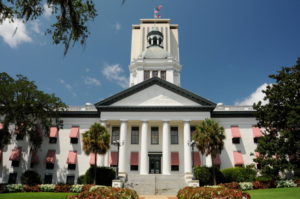
The Senate Appropriations Committee on Thursday advanced a bill that would create a new state-funded program to eliminate a waiting list of 13,000 for the Florida Tax Credit Scholarship for lower-income families.
SB 7070, which would establish the Family Empowerment Scholarship, previously passed two other committees. But the Appropriations Committee approved a significant “strike-all” amendment by the bill’s sponsor, Education Committee Chair Manny Diaz (R-Miami).
The changes include increasing the income eligibility limit for families to 300 percent of the federal poverty level ($77,250 for a family of four), up from the previous version’s 260 percent, while giving priority to those families with household incomes up to 185 percent of the poverty limit ($47,637 for a family of four). That puts the Senate bill in line with the income limits in a similar bill, HB 7075, being considered by the House.
The Senate bill also raises the cap on the number of students served to 18,000 in the program’s first year, up from 15,000. The number would expand each year by 1 percent of the state’s total public school enrollment. The House bill would accommodate 28,000 students in the first year.
Diaz told committee members Thursday that the bill prioritizes the lowest-income, neediest families.
“I will stand up here and defend that all night long,” Diaz said. “At the end of the day, these students deserve the same chances as every student who goes to a great public school, or whose parents can afford to put them in a private school.”
Sen. Bill Montford (D-Tallahassee) praised the bill as “a historic piece of legislation” but voted against it, saying he couldn’t reconcile using money from the Florida Education Finance Program (FEFP) to fund the measure.
“I know we did it with the McKay (Scholarship for students with special needs), and it worked extremely well,” Montford said. “But this is a huge leap. If there’s a way to work with you on that one piece, I’d like to.”
In response to a question from Sen. Perry Thurston (D-Fort Lauderdale), who voted against the bill, Diaz said the measure “takes no money from the FEFP,” saying that students on the scholarship are educated at 95 percent of district average.
“The district keeps 5 percent for each student they’re not educating,” Diaz said.
Several people spoke in favor of the bill. Among them was Carletha McGuire, who worked more than 20 years with special needs students as a paraprofessional in Miami-Dade public schools. McGuire is raising two grandchildren and a nephew, each of whom have been on the scholarship.
She said her nephew Corey used the tax credit scholarship to attend Kids Learning Center for two years, which boosted him academically so he could qualify for the magnet program at Coral Reef High School in Miami. He is taking dual enrollment classes and is expected to graduate this year with an associate’s degree. Her older granddaughter, Martina, graduated from Grace Christian Preparatory and now attends Bethune-Cookman University on a partial academic scholarship.
Her younger granddaughter, Monique, started at Kids Learning Center on the scholarship but was on the waiting list this year. McGuire had to transfer her to a public school for fifth grade, and her grades have slipped.
“She tells me every morning, ‘I just want to go back to Kids Learning Center’,” McGuire said. “So I am asking you: Let all our kids off the waiting list by creating the Family Empowerment Scholarship. There are so many who are being left behind. Let’s help these kids get what they need so their parents and grandparents don’t have to worry.”
Nicolette Springer, legislative advocate with League of Women Voters of Florida, was among the bill’s opponents. She called the legislation unconstitutional because it would allow public dollars from the FEFP to be spent at private schools
“My heart goes out to the children here today,” Springer said, referring to scholarship recipients and those on the waiting list. “Opportunities would be in their neighborhoods if public dollars had not been stripped.”
In response to a question from Sen. David Simmons (R-Longwood), Springer said the League of Women Voters would not support any bill that takes public money from public schools.
Later, in response to those arguments, Diaz said: “When this discussion comes up, there’s always an argument about do we spend enough money, money being diverted [from public schools]. I always ask this question: What is the right amount? When is enough enough?”
He noted the maximum number of students who would receive a Family Empowerment Scholarship would 129,000, out of 2.8 million public school students statewide.
“Public education is about the education of the children, and not about the institutions,” Diaz said.
The Florida Tax Credit Scholarship serves more than 100,000 students statewide with an average annual family income of $25,751. But this year, for the first time in 14 years, a slowing rate of growth in fundraising resulted in fewer students served than the prior year.
Demand for the scholarship remains strong. More than 148,000 students have started applications for the 2019-20 school year, and more than 90,000 scholarships have been awarded. About 55,000 are new applicants, up 45 percent from this time last year.


